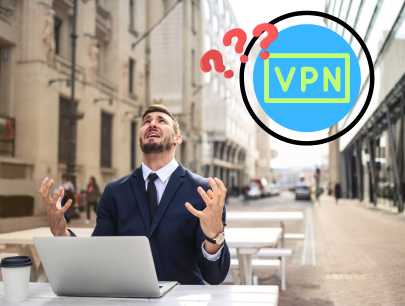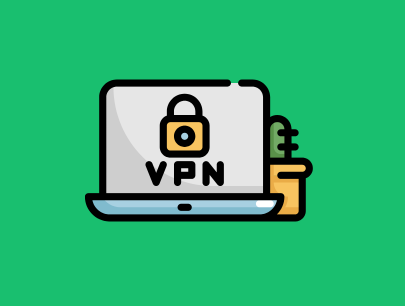It's more than annoying when your VPN connection doesn't work. I will show you below what you can do if you have VPN problems. VPN problems can have several causes, here are the most common ones, which I will take a closer look at in the course of the article:
Tip: Basically, use a stable and trusted VPN provider like NordVPN* or CyberGhost*. I use both of these services myself and have always been able to swiftly resolve the VPN issues that rarely arise, as described below.

VPN problems: Here is a quick guide on how to proceed to find the cause of your VPN problems.

First, check if your computer is connected to the Internet. It might not be your VPN client at all, but there are problems with the Internet connection right now. Maybe you have the option to connect to the Internet in a different way, for example via a mobile hotspot. Check your network settings to make sure that the connection does not fail at this point.

Has it been a while since you updated the software on your computer or smartphone? Maybe an outdated VPN app is the problem. Just take a quick look to see if your VPN is up to date.

If your computer or smartphone is connected to the Internet and the VPN clients are up to date, try to connect to a VPN server again.

If all your attempts to establish a VPN connection fail, hopefully you have a VPN service with a reliable support. The best VPNs on the market offer 24/7 live chat. Thanks to modern technology like automatic translations, you can often communicate with the respective provider in your local language. Almost all good providers can also be reached via email.
In this section, I'll explain in detail what problems there can be with your VPN tunnel and what solutions you can try. Let's take a closer look at the most common reasons and errors, and also discuss what can be considered as a troubleshooter.
There is a lot of choice on the VPN market and there are many bad services on the market. If you want to avoid difficulties with access, it's best to use a reputable service.
The different VPNs have strengths and weaknesses, of course. The ones featured in this post are universal and work well. They also run many servers so there is no congestion.
With the good VPNs, you don't have to buy a pig in a poke. NordVPN*, for example, offers a 30-day money-back guarantee, and CyberGhost* VPN even lets you test it risk-free for 45 days, as long as you opt for the long-term offer during your tests.
This paragraph is obvious, but sometimes it's that simple. One little typo in the credentials and the VPN goes on strike.
With some VPN providers, you only have to log in on one device and then you can connect others with a code. This is convenient because you can easily avoid mistyping.
The type of registration doesn't matter, though. In any case, check to see if you made a typo. It's quick to test, and maybe the solution really is that simple.
As with all of IT, devices can have dropouts or refuse to work properly. If you're connected to a broken VPN server, your connection may be twitching. Or maybe the infrastructure or data center you're currently connected to is overloaded.
The solution in this case is pretty simple - a server change. See if your VPN provides other servers in the same country or if the connection works better with another country near you.
There are VPN clients that show you the latency to the respective VPN server. You can't derive maximum speeds from this, but you'll get an idea of how fast the remote site is responding. Low latency often means higher speeds.
It's also advantageous if you take a VPN that provides many servers. The more servers a service has, the less likely it is to be overloaded and the less likely access errors are.
Perhaps you are having problems with the DNS servers. It may be that you manually changed them in the network settings for some reason and it slipped your mind.
Be sure to check this and make sure the DNS servers are configured correctly. The problem is that there is often no specific error message here that will point you directly to the problem.
At this point, also check your router to see if it is assigning the correct DNS servers to your computer or smartphone in addition to the IP address.
If you are dealing with a restrictive firewall, you may need to configure your client differently. Schools, libraries, and even various companies work with such technologies to have more control. Most VPNs allow you to set a different protocol. This might already help you to bypass a blockade.
Some providers provide cloaking modes and special servers, with which you can bypass the more or less strong blockades.
By the way, it is also possible that an antivirus software blocks your VPN client. This is relatively rare, but I wanted to mention it.
Are you having recurring difficulties accessing the Internet? Then maybe your connection in general is not the best and the VPN clients can't help it at all.
You can check this by sending a so-called ping. On desktop operating systems like Windows, macOS, and Linux, this is easy. Just ping one or several IP addresses. Then you will not only see if there is an internet connection, but also how reliable it is.
If there is packet loss at this point when you are pinging a website, then it suggests a poor internet connection. In this case, it's probably not the VPN servers, but your ISP's infrastructure. Of course, faulty hardware such as a broken router can also be to blame.
If WLAN / network are overloaded, there can also be connection interruptions. How much your Internet connection is overloaded, you can often find out with the download speed.
You may know your base speed. If you do some speed tests at this point, you can already see how fast your internet connection is. If that deviates greatly from normal performance, you may be dealing with congestion.
Who is to blame at this point? It's hard to say. It could be the ISP, or it could be someone on your network who is responsible for your connection problems.
Different VPNs allow a different number of simultaneous VPN connections. Usually it is between 5 and 7, some allow 10 and few like PIA* (Private Internet Access) even allow unlimited connections.
Therefore, check how many devices are currently connected to the Internet at the same time. If the maximum number of simultaneous connections is exceeded, your VPN app may not be able to connect to the Internet because of this.
At this point, I would like to note that a router usually counts as one connection. So if you install the VPN on your router, you can usually use it to connect an infinite number of WLAN-enabled devices to the Internet through it.
This is also a point that is often overlooked. Just like other companies, VPNs occasionally update their software. In doing so, they patch up bugs and so on. Updates are just part of the modern world.
Many people, however, often tend to ignore such updates as well. Sometimes, however, there are changes that cause an older VPN app to stop working. In this case, you first need to update your VPN apps to the latest version and then try to connect again.
There are countries where VPN providers are blocked. In some countries such services are completely banned, in others only blocked. In any case, find out for yourself about the legal situation in your country.
In any case, it is the case that some VPN services can bypass blocks and others cannot. This is due to whether they have a stealth mode or not.
CyberGhost VPN, for instance, is an excellent VPN provider for streaming platforms. However, the service doesn't provide a VPN protocol, which lets you bypass strict censorship firewalls like China's Great Firewall. The VPN does not work in this country and other places, with similarly strong blockades.
In such a case, a VPN service like NordVPN is a better option. The provider provides cloaked VPN servers that are specifically designed to bypass strict firewalls.
With a paid VPN, this point is usually not a problem. If you buy a VPN, you usually have unlimited data at your disposal.
With free VPNs, however, there is usually limitation and besides the number of available servers, the most common limit is the available bandwidth. At the same time, there are VPN services that are more generous than others. With a few, you get up to 10 GBytes of data per month. Others, however, offer only 1 GByte or even less.
Here's a quick checklist if you can't establish a VPN connection:
Since I travel a lot and live abroad myself, the topic of VPN has been with me for a very long time. It is very important to me to know that my sensitive data is protected when surfing the Internet. In addition I also like to stream Formula 1 races without having to pay for paid TV.
In my opinion, the following three VPN services that I use myself and have tested extensively are the most reliable on the market.
I like using NordVPN* quite a bit. It is known to be excellent at bypassing geoblocking. NordVPN also works in countries with censorship or VPN blocking. I have already been able to bypass one or two strict firewalls with the service. For this, NordVPN offers obfuscated servers that have a stealth mode. However, you have to use OpenVPN as protocol.
Another great feature with this service is the integrated adblocker. Not only can you block ads and trackers, but the feature also protects you from phishing and malware to a certain extent. So if you visit a website that is known to be contaminated with malware, the threat protection kicks in. There is also a kill switch. This emergency switch protects you should your virtual private network unexpectedly fail.
NordVPN clearly stands out from most of its competitors with its Meshnet feature. With this feature, you can set up a vLAN, or virtual LAN, with just a few clicks. This is not only interesting for small companies, but is also suitable for LAN parties. With the help of the NordVPN client you can also easily share files via Meshnet.
You can test NordVPN risk-free thanks to the 30-day money-back guarantee. If the service doesn't meet your requirements, you simply request a refund. NordVPN supports Windows, Android, macOS, iOS and Linux. 6 devices are allowed at the same time.
CyberGhost* is a great alternative. The VPN is a reliable partner, especially when streaming. I can't remember any outages. The network of the VPN service is quite large and you will always find a reliable server.
Since I just mentioned streaming. Here it is important that the service regularly rotates its IPs to be able to bypass the geoblocking of streaming platforms like Netflix, Amazon Prime, BBC iPlayer and so on. For this, the VPN has a number of special VPN servers.
As you can see in the screenshot above, the VPN also supports torrents and offers dedicated low-latency gaming servers.
The VPN programs are user-friendly and you get them for all popular operating systems. The VPN works well on Windows, macOS, Android, iOS and Linux as well. For Windows, the service offers a special browser that also blocks ads.
What's also great is that you're allowed to run up to 7 devices simultaneously. That should be enough for a family. The use on a router is allowed. This allows you to connect all WLAN enabled devices on your network and it counts as one connection.
Another special feature is that CyberGhost VPN offers 45-day money-back guarantee on long-term subscription. This is much higher than most other companies and you can test risk-free before you decide.
Your VPN is not working because you have exceeded the number of PCs or smartphones allowed at the same time? In that case, you should take a closer look at PIA*. Not only is the service among the cheapest on the market, but there are no limits on the number of clients used at the same time.
The service also has such features as multi-hop, obfuscation and split tunneling. PIA is available for all popular operating systems, so Android, iOS, Windows, macOS and also Linux. For the latter, PIA even provides a GUI and that is a special feature.
PIA also offers a 30-day money-back guarantee. So you get to test first risk-free and can decide without pressure if it's right for you or not.
Now what is the cause if your VPN is not working? Unfortunately, there is no blanket answer to this question. There are many points that can be to blame. Maybe it's your ISP or even a server that's having a hiccup right now.
It's best to follow our checklist and try to get to the bottom of the problems. In case of emergency, contact the support of the respective VPN provider, after all, you are paying for it.
The best VPN providers not only help you 24/7, but you can also communicate with them in your language. Modern companies use automatic translations.
In addition, the best VPNs work with multiple protocols. In addition to the renowned OpenVPN, you'll usually find the new and sleek WireGuard.
As this article shows, there can be many reasons why your VPN may or may not be working. Here are a few answers to common questions when you run into problems and your VPN connection goes on strike
You need to find out what the problem is. It might not be the VPN software that is the problem, but your operating system, device, or ISP. You can definitely avoid VPN problems if you use reputable VPN services.
Of course there are. Not every VPN service is equally good and it also depends on your requirements. If you need VPN servers to unblock streaming platforms, check out a provider like CyberGhost VPN. If you want to avoid blocking and censorship, a solution like NordVPN is suitable. If you need unlimited simultaneous connections, PIA is a good choice.
Does your VPN keep reconnecting to a VPN server? This could indicate a problem with the network. Maybe you are too far away from your WLAN router. Maybe there is a firewall in your network that blocks VPNs. Try a VPN server in another country or try to change the protocol in the VPN settings.
There can be several reasons why you can't connect. Often a firewall denies you access. In this case you need a VPN with a stealth mode.
But also a defective server of your VPN provider or other defective hardware can be reasons why it hangs. Maybe your ISP (internet service provider) is to blame. Unfortunately, it is not possible to say in general why your VPN is not working. You have to do some tests and with a little luck you can solve the problem quickly. If you get stuck, contact the support of your provider. The best VPNs offer 24/7 live chat as well as support via email.
